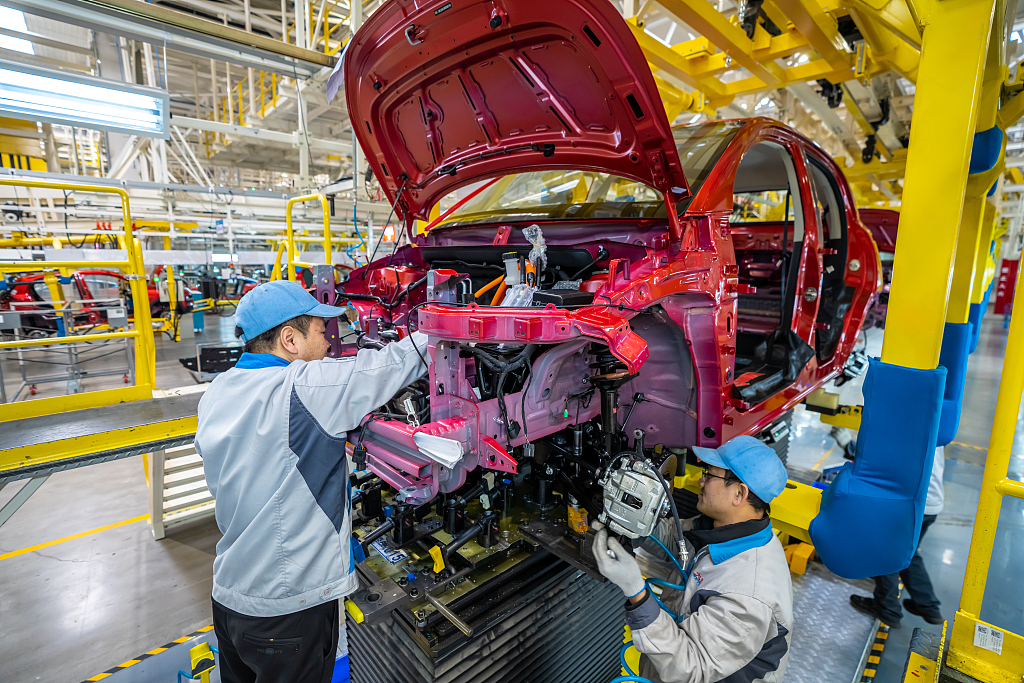Experts, executives dismiss 'overcapacity' narrative


China holds a significant position in the global supply chain, although that's not due to Chinese policy, but rather the result of companies and consumers worldwide making their own decisions, experts and executives said.
After all, they added, China, as the world's second-largest economy, has a comparative advantage in its economic model — one that makes it the go-to manufacturing hub of the world.
The so-called "China overcapacity" narrative has been employed by certain Western countries, primarily the United States, as a political tool to tarnish and suppress the Chinese economy, the observers said. Behind the slander lies an agenda of anti-globalization and protectionism that ultimately hinders normal global trade and undermines the common interests of nations, they said.
During US Treasury Secretary Janet Yellen's trip to China in early April, her second visit to the country in nine months, she made the comment that China is flooding global markets with cheap goods, particularly in new green industries.
The narrative has been translated into concrete actions such as probes launched by the US and the European Union into China's electric vehicles, based on unfounded allegations of state subsidies and aiming to choke the role of China's green product supply.
The notion of excess capacity should not be simplified or attributed solely to one country, Premier Li Qiang said during talks with German Chancellor Olaf Scholz in Beijing last week.
From a market perspective, the amount of production capacity is determined by the relationship between supply and demand, and having production moderately greater than demand is conducive to full market competition and promoting the survival of the fittest, Li said.
Taking a global view, each nation focuses on developing industries where it holds a comparative advantage, while relying on other countries for sectors where it lacks capacity. By recognizing and leveraging their respective strengths, countries can collaborate for shared development, Li added.
Lan Fo'an, minister of finance, said at a meeting held by the Development Committee of the World Bank Group in Washington on Friday that, going forward, China will accelerate the development of new quality productive forces and promote a sustainable green transformation. The country aims to share its development opportunities and dividends with the world, he added.
Albert Park, chief economist at the Asian Development Bank, said concerns about Chinese exports in terms of overcapacity are not supported well by evidence, noting that the World Trade Organization addresses noncompetitive practices with anti-dumping and countervailing duties, and there is no strong evidence that either applies to China.
Robin Xing, chief China economist at Morgan Stanley, said, "It is unfair to specifically mention China's industrial policies and imply that China's competitive advantage is subsidized by the government", as many countries are allocating government subsidies and introducing industrial policies to boost strategic industries and productivity.
For instance, the US Inflation Reduction Act — the largest US investment ever in clean energy and climate action — was signed into law by US President Joe Biden, and the White House has awarded billions of dollars in subsidies for advanced semiconductor manufacturing.
In the lead-up to the US presidential election in November, politicians are increasingly using issues of overcapacity and the trade imbalance with other countries for political leverage, with political considerations taking precedence over genuine economic concerns, observers said.
Yao Yang, director of the China Center for Economic Research at Peking University, said: "The Biden administration claims to uphold a worker-centered trade policy, and its recent moves, from raising the capacity issue to launching a trade probe against China, are more like gestures to please and curry favor with certain groups of voters, rather than pursuing any economic considerations.
"The US government is likely to adopt an even tougher stance on China as the 2024 presidential election approaches," Yao added. "However, China exports few electric vehicles or steel and aluminum products directly or indirectly to the US, and if the US increases tariffs on those products, it will not bring any economic benefits to itself, while disrupting the security and stability of global industrial and supply chains."
Furthermore, Yao said that "if the US is really concerned about the issue it is hyping, it should open its door wider for Chinese investors, instead of imposing various restrictions on them. That way, Chinese enterprises with advanced EV and green technologies can invest in the country and set up factories to contribute to local employment and tax revenue".
On the contrary, a critical issue facing the world today is not an oversupply of green energy capacity, but rather a severe shortage.
According to the International Energy Agency, annual sales of electric vehicles is projected to reach 45 million units by 2030, more than four times the demand in 2022.
Wang Jun, president of Chang'an Auto, said that China, with cutting-edge technologies and sophisticated, comprehensive industrial chains, has explored a successful path for the global new energy vehicle industry.
"China has cultivated numerous high-quality component enterprises, including over 1,000 battery companies," Wang said.
In 2023, China became the world's No 1 car exporter. This achievement was driven by a surge in the shipments of NEVs, which totaled 1.203 million units, according to the China Association of Automobile Manufacturers.
Huo Jianguo, vice-chairman of the China Society for World Trade Organization Studies, said, "As long as Chinese enterprises act in line with international rules and maintain competitiveness with high quality and low cost of products and improvement in customer service, those restrictive measures will only create difficulties and obstacles temporarily, but will not stop us from forming new competitive advantage in emerging areas."
Ouyang Shijia contributed to this story.




































